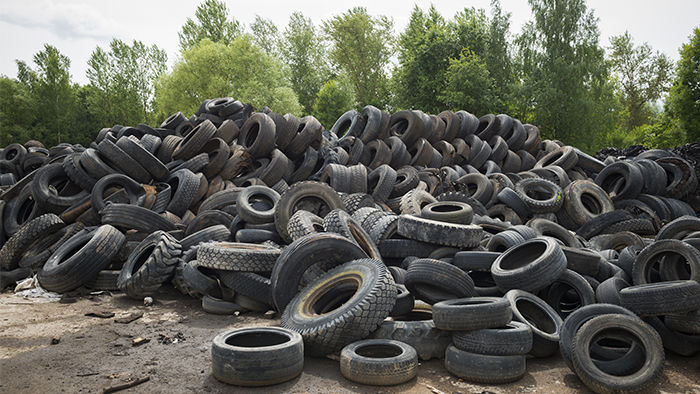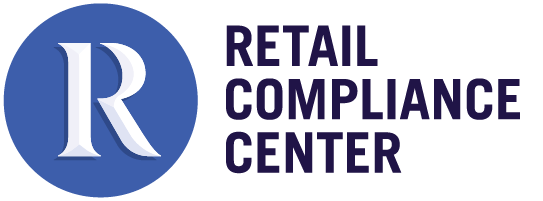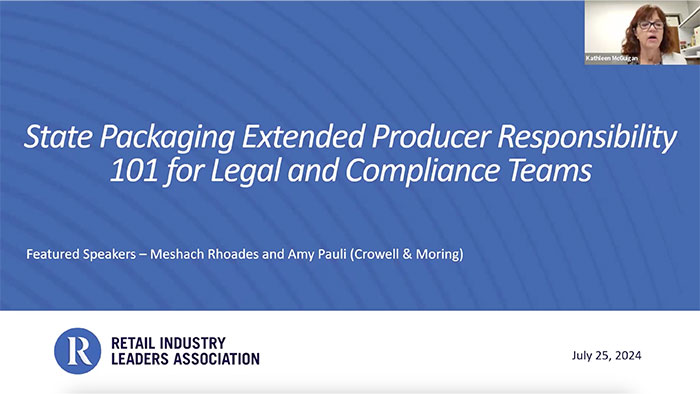Other Regulated Waste
This regulatory area covers the management (storage, transportation, and disposal or recycling) of non-hazardous solid wastes such as municipal waste, tires, medical waste, used oil, electronic waste, and appliances, as well as a variety of other materials. Most of these types of waste are regulated at the state and local level. For information about hazardous waste, visit the RCC Hazardous Waste Regulations page. RCC Store Department pages have information on waste associated with specific departments.
Compliance Considerations
One of the main compliance considerations for non-hazardous waste is to understand the local requirements where you operate. A good waste hauler can be a valuable partner in managing your waste, but don't forget that your facility is ultimately responsible for complying with the regulations. Reducing the amount of waste generated can reduce compliance risk as well as save money and some retailers are committing to operating zero waste facilities.
Municipal Solid Waste Management
State and local governments have the primary regulatory authority over non-hazardous solid waste or trash from retail businesses. Many jurisdictions ban businesses from sending certain types of material to municipal solid waste landfills. The bans are often designed to encourage recycling as well as to keep hazardous material out of landfills. While hazardous wastes and universal wastes generally must be sent to permitted hazardous waste treatment, storage, or disposal facilities, some municipal solid waste facilities are authorized to accept wastes from Very Small Quantity Generators, if allowed by state and local regulations.
Other types of material that in some jurisdictions may be subject to landfill bans and/or require special management include:
- Appliances or "white goods"
- Automotive batteries (i.e., lead-acid batteries)
- Construction and demolition (C&D) waste
- Electronic wastes
- Liquids, including waste milk, soft drinks, and other beverages
- Needles and sharps from healthcare settings
- Organic waste such as food scraps
- Paper, including office paper and newsprint
- Recyclables including glass, aluminum cans, and some types of plastics
- Some types of treated wood
- Tires
- Used oil
- Wooden pallets
Many jurisdictions, including counties and cities, have mandatory recycling laws. These laws may list materials that must be recycled as well as have requirements for containers, signage, recycling plans, and record keeping. Some states also have bottle return laws, which require a deposit at the time of purchase that is reimbursed when the consumer returns the empty bottle.
State and local jurisdictions also typically require waste haulers to be permitted, with additional permits required for some waste types, such as medical waste.
Batteries
There are different requirements for different types of waste batteries. Some are considered hazardous waste and regulated at the federal and state levels as universal waste. Many types of batteries can be recycled. State and local jurisdictions often have recycling requirements for batteries. Call2Recycle has more information about battery recycling.
Lithium Batteries Fact Sheet
A fact sheet detailing regulations on transporting lithium batteries and the safety hazards of transporting lithium batteries.
View Fact SheetUsed vehicle lead-acid batteries are considered hazardous waste, but most states have streamlined requirements for generators who send these batteries for recycling and most states require used lead-acid battery recycling. The Battery Council International has a summary of state lead-acid battery laws.
Construction Waste
There are usually state or local requirements for non-hazardous construction waste. Non-hazardous C&D debris can be recycled or disposed of at municipal solid waste landfills, C&D only landfills, or incinerators, as allowed by state and local regulations. Most C&D waste such as asphalt, concrete, shingles, steel, and wood can be recycled. EPA has guidance on sustainable management of C&D material.
Some C&D wastes, such as lead paint, asbestos, asphalt waste, some adhesives, and waste from painting (e.g., acetone, paints with a low flash point) is considered hazardous and subject to hazardous waste regulations or other special management requirements. The Construction Industry Compliance Assistance Center has information on hazardous waste from construction.
EPA and state and local governments also impose requirements on the removal of certain hazardous substances from buildings. Before demolishing a building or conducting a renovation, conduct a hazardous building materials investigation or survey to identify potentially hazardous materials. Common hazardous materials with special management requirements include asbestos-containing materials (ACM), lead-based paint, mercury-containing equipment, and polychlorinated biphenyls (PCBs). Hazardous materials can impact costs, and may trigger regulatory and abatement requirements.
Electronic or E-Waste
While there is no federal mandate to recycle e-waste, many states and local governments have mandatory electronics recycling programs and/or landfill bans, so state and local regulations must be consulted. The RCC's eWaste Matrix outlines state electronic waste rules that apply to retail and the National Center for Electronics Recycling has more information on compliance and regulations.
eWaste Matrix
Compliance matrix that provides a detailed overview of legislation across the U.S. that requires retailers to manage waste electronic products.
View MatrixSome electronics, such as cathode ray tube (CRT) computer monitors, are considered hazardous wastes. Some electronics containing mercury (e.g., thermostats, pressure gauges, and mercury switches) may qualify as universal waste. In addition, some electronic wastes being recycled may be exempt from hazardous waste regulations if they meet the criteria for exclusions or exemptions based on scrap metal, circuit boards, or precious metals content. EPA has more information on its electronics donation and recycling page.
Food and Compstable Food Packaging Waste (Organic Waste)
A major environmental impact from food service is organic waste, i.e., food waste and compostable food packaging, which are generally considered municipal solid wastes and typically regulated at state and local levels. In this context, "organic" refers to waste from plants and animals that is biodegradable such as fruits and vegetables, meat, cheese, eggshells, bones, some paper, and flowers, and is not related to the "organic food" designation for products produced without synthetic pesticides and chemical fertilizers.
Some states and municipalities require composting of organic waste from large business and institutional generators and some promote the food recovery hierarchy designed to reduce or divert waste for other uses such as food for animals. The RCC Mandatory Organics Recycling Regulations Fact Sheet has information on California’s Mandatory Recycling Regulations as well as a look at other jurisdictions. Other resources include Find a Composter and the Food Waste Reduction Alliance toolkit of leading practices in reducing food waste.
A number of local jurisdictions ban or limit the use of polystyrene food packaging (usually for expanded polystyrene [EPS] or Styrofoam) because this material does not break down in nature, is not economical to recycle, and is expensive to clean up from water and land. Regulations may also require takeout food packaging to be compostable or recyclable
A common state and local waste management requirement is the weekly or twice-weekly emptying of compactors and dumpsters to control the spread of disease-carrying pests (vector control). Dumpsters with food waste, as at grocery stores and food service establishments, are often required to be emptied more frequently.
Mandatory Recycling and Disposal Bans
View Fact SheetMedical Waste from Clinics or Veterinary Departments
Waste such as bandages, medical gloves, instruments or lancets, medical sharps (needles), and swabs may be subject to regulation as medical waste in many jurisdictions.
Typically, facilities are required to have closed and marked "biohazard" red containers with a puncture-resistant bag or lining for collection of medical waste onsite. Specific requirements typically apply for packaging, storing, and transporting medical waste. Some states require training, tracking, and recordkeeping. Certain types of medical waste may also be subject to federal requirements for transportation.
Plastic Bags
Many states and local jurisdictions have or are implementing regulations to reduce the use of plastic carry out bags in an effort to keep the bags out of landfills, from roadside litter, and out of streams, lakes and oceans. This legislation can outright ban on plastic bags, require stores to establish at-store recycling programs for plastic bags, or establish a fee for bags at the cash register. The RCC Consumer Bag Legislation Summary Matrix provides an overview of plastic bag related legislation at state and local levels.
Consumer Bag Legislation Summary Matrix
View MatrixTires
Scrap tires are regulated primarily at the state level. Programs typically include taxes or fees on automobiles or tires to fund scrap tire programs, scrap tire market development activities, licensing or registration requirements for scrap tire haulers or processors, manifests for scrap tire shipments, and tire pile elimination activities.

Used Oil and Oil Filters
Some used oil may be hazardous waste. Certain types of used oil destined for recycling may be subject to streamlined requirements under the EPA hazardous waste regulations (40 CFR 279) and state analogs. Under the federal requirements, generators must follow good housekeeping practices such as labeling containers with "used oil," keeping containers in good condition, and preventing leaks and spills. Used oil transporters must have an EPA ID number. The EPA has additional information about managing used oil.
Most states also have used oil regulations, which may be more stringent than the federal requirements.
Used oil filters, when properly drained and recycled, are not considered hazardous waste. (This exemption does not apply to terne-plated oil filters, which are only used for some heavy-duty applications.) States may have additional regulations for used oil filters and often provide guidance on handling and recycling.
Wooden Pallets
Most wooden shipping pallets are recyclable, and some states have banned wooden pallets from landfills. Shipping companies may take back pallets, and there are also pallet recycling companies.
Sustainability and Reducing Compliance Risk
Retailers are increasingly looking at how to reduce their waste and promote a circular economy rather than continue with the current make, use, and dispose linear system. This requires a more holistic approach that starts with product design and flows back rather than with material ending in landfills. There are a number of benefits to reducing waste including saving money, reducing greenhouse gas emissions, and being seen as a leader. There are many resources to help companies reduce different types of waste including:
- Circular Economy Toolbox that has business practices and case studies.
- EPA's voluntary WasteWise program encourages more sustainable practices and waste reduction. Although EPA is no longer accepting WasteWise partners, it plans to evolve its Sustainable Materials Management partnership programs.
- Zero waste resources include the Zero Waste Network and TRUE Zero Waste Certification.
- Sustainable Packaging Coalition is an industry working group focused on more sustainable packaging.
- Resources related to food waste include ReFED and Further with Food.
Related Content
eWaste Matrix
Overview of state legislation with requirements for retailers on managing waste electronic products or ewaste.
Mandatory Recycling and Disposal Bans Fact Sheet
Overview of state-level recycling regulations and commonly recycled materials such as paper, plastic, metal and glass.
Consumer Bag Legislation Summary Matrix
Summary of consumer bag legislation by state and local jurisdictions, including bans, fees, and specifications for different kinds of allowable bags.
Lithium Batteries Fact Sheet
FAQs on requirements for shipping lithium batteries.
Product Stewardship & EPR Matrix
Summary of state product bans, EPR and product stewardship legislation for packaging and products such as carpet, batteries, electronics, paint and more.
Tags
-
Solid Waste
-
Overview


